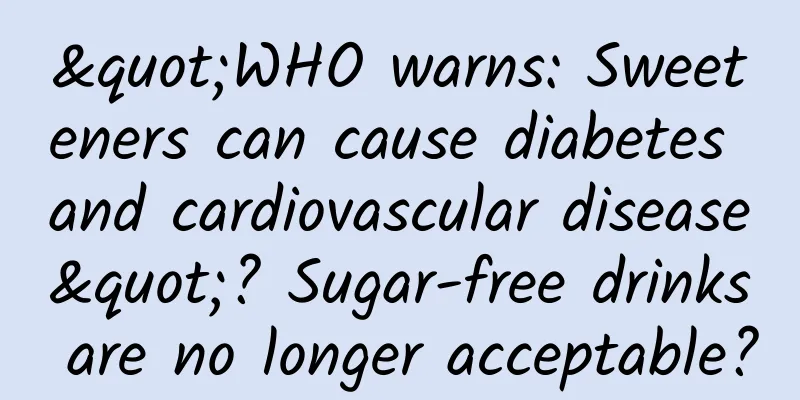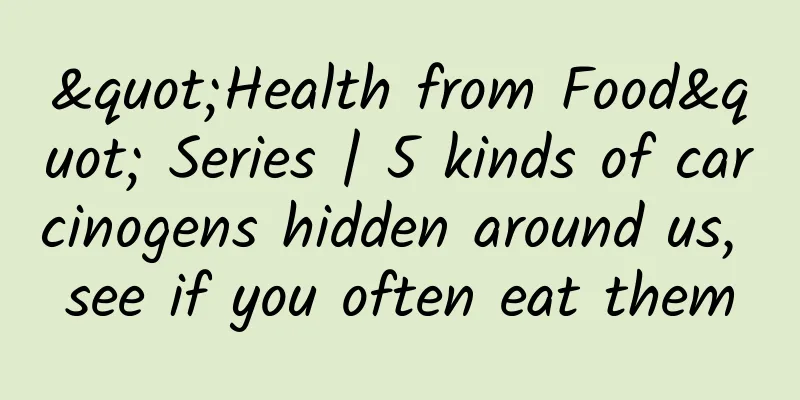"WHO warns: Sweeteners can cause diabetes and cardiovascular disease"? Sugar-free drinks are no longer acceptable?

|
On May 15, the World Health Organization released new guidelines on non-sugar sweeteners, advising the public not to use non-sugar sweeteners to control weight or reduce the risk of non-communicable diseases. Image source: WHO official website The release of this guideline is really worrying. What are non-sugar sweeteners? Do they really have an impact on health? How should we view this guideline? 01 Are non-sugar sweeteners = “sugar substitutes”? What are some common non-sugar sweeteners? The non-sugar sweeteners mentioned in this WHO guideline are not exactly the same as what we commonly call "sugar substitutes". The non-sugar sweeteners mentioned in the WHO guidelines refer to all non-nutritive sweeteners that are not sugars , whether they are artificially synthesized, naturally produced or chemically modified. Common non-sugar sweeteners include: acesulfame potassium, aspartame, cyclamate, neotame, saccharin, sucralose, steviol glycosides, etc. However, this guideline states that low-calorie sugars and sugar alcohols are sugars and sugar derivatives that contain calories and are not considered non-sugar sweeteners. In other words, maltitol, erythritol, xylitol, sorbitol, etc. are not considered non-sugar sweeteners. We consider these to be sugar substitutes. Xylitol. Copyrighted image from the gallery, no permission to reprint 02 What are the health risks of long-term consumption of non-sugar sweeteners? Is there a big difference between natural and synthetic? Some media reported that long-term consumption of non-sugar sweeteners may have some potential health risks, such as increasing the risk of diabetes, cardiovascular disease and death. In fact, this statement is not entirely accurate. According to current research, long-term consumption of non-sugar sweeteners within a reasonable range will not harm your health, nor will it really cause you to get diabetes or heart disease . There is no obvious difference whether they are natural or artificial. A large part of the WHO guidelines is an analysis of possible health risks in accordance with the requirements of evidence-based medicine. Evidence-based medicine analysis evaluates the credibility of a diagnosis based on its level of evidence. For example, if the level of evidence is extremely high or high, it means that the health hazard is real. If the level of evidence is low or extremely low, it means that the reliability of the evidence is lower. In fact, the WHO guidelines clearly state that the level of evidence for non-sugar sweeteners and health risks such as type 2 diabetes, cardiovascular disease, and all-cause mortality is low or very low. The WHO points out that "it will not produce the expected health effects such as weight control" and may have "potential adverse risks", such as increasing the risk of type 2 diabetes and cardiovascular disease. That is to say, these so-called "health risks" are potential and may exist, but the level of evidence is low. Copyright image, no permission to reprint Many media and some self-media did not tell people about the level of evidence when interpreting the case , which is actually wrong. 03 What does “low-calorie sugars” mean in the guidelines? What is the difference between sugar and non-sugar sweeteners? Low-calorie sugars are mainly some sugar alcohol substances . Sugar alcohols are a large family. Common ones include xylitol used in chewing gum, mannitol used in constipation medicines, erythritol used in many sparkling waters, maltitol, sorbitol, lactitol, etc., which are also common sugar alcohol substances. Compared with sugar, they are sweet but low in energy, and often have a little bit of calories, but not as much as real sugar. Some have extremely low calories, almost 0. Compared with non-sugar sweeteners, they are mainly carbohydrates in structure, but the energy is relatively low. Sugar alcohols are widely used in "sugar-free" and "low-sugar" pastries, sweets, chewing gum and other foods. They have certain benefits in reducing energy. However, if the dosage is too large, it will promote excessive intestinal movement and cause diarrhea. Among the large family of sugar alcohols, erythritol has been used a lot in recent years and can be called the star among sugar alcohols. Compared with other sugar alcohols, it has lower calories, relatively less effect on promoting diarrhea, and a softer and more natural sweetness, so it is favored by consumers and businesses. But it also has some controversy. Some time ago, someone said that it can cause heart problems, but this is not true, so don't worry too much. Copyright image, no permission to reprint 04 Which sweeteners are relatively safe according to the guidelines? Based on current research, all approved sweeteners are safe as long as they are used reasonably within the prescribed range. All sweeteners must undergo rigorous risk assessment before being approved for use. Currently, these permitted sweeteners have also been recognized by multiple international organizations, national, and regional food safety authorities. For example, the World Health Organization's Expert Committee on Food Additives (JECFA) also believes that sweeteners, both natural and synthetic, are safe when used in accordance with regulations. This conclusion is also recognized in the WHO guidelines. 05 Are sugar and sugar substitutes harmful? Can I still eat sugar? Sugar and sugar substitutes are problematic only if they are consumed in excess . In fact, as long as they are consumed in moderation, they are safe. Sugar is also an important nutrient needed by our human body. Sugar belongs to carbohydrates and can provide energy to our human body. Only with enough energy can the human body walk and work. Sugar is also a component of human antibodies, enzymes, cells and tissues, ensuring the full oxidation of fat, forming glycogen in the body, and storing sugar in muscles and liver. The "Dietary Guidelines for Chinese Residents" recommends that adults should not consume more than 50 grams of added sugar per day, and it is best to control it within 25 grams. Copyright image, no permission to reprint 06 What do you think of this guideline from WHO? First, don’t panic about sweeteners. Many media and self-media are saying that long-term consumption of non-sugar sweeteners can lead to problems such as diabetes and heart disease, but in fact the level of evidence for this is very low and there is not enough scientific evidence. As long as it is used within the prescribed range, people should not panic. Second, don't rely too much on the effects of sweeteners. Many people choose sugar-free foods and drinks with sweeteners in the hope that they can help them lose weight and control their weight. If the total amount of food remains unchanged, replacing added sugar with sweeteners can indeed reduce energy intake. However, the key to weight management and weight loss is the balance of total energy intake and expenditure. Sweeteners are not the main determining factor. If you drink sugar-free drinks but eat a lot of meat and desserts, and do not exercise after eating, you will still gain weight. We cannot just pin our hopes on sweeteners. Sweeteners are not diet pills, and we should not overly rely on their effects. To lose weight and control weight, we still need to control our diet and exercise. Copyright image, no permission to reprint Third, sweeteners are an option for reducing sugar, but if you want to be healthy, the key is to achieve a balanced diet. Reducing sugar intake has been a hot topic in recent years, and many people believe that choosing sweeteners is healthy. In fact, the key to a healthy diet is a reasonable diet and a balance between eating and moving, including actively controlling excessive pursuit of sweets and sweet taste. The WHO report also believes that if people cannot reduce their preference and pursuit of sweetness, then the suggestion of "no sweeteners" is meaningless, because people will go back to eating sugar in pursuit of sweetness. Therefore, we should develop healthy eating habits. Instead of dreaming of an absolutely healthy and calorie-free sweetener, it is better to change the pursuit of sweetness and sweets, and gradually change the habit of eating sweets, just as an occasional, small amount of enjoyment. Author: Ruan Guangfeng, Director of the Science and Technology Department of the Kexin Food and Nutrition Information Exchange Center Reviewer: Zhang Na, Associate Researcher, Doctoral Supervisor, Peking University School of Public Health |
<<: "National Breastfeeding Awareness Day", is breast milk no longer nutritious after 6 months?
Recommend
Lunar soil bricks: the first step in building a house on the moon
As my country's lunar exploration project con...
What mini programs can be made now?
Q: What mini-programs can be made now? Answer: Fi...
Top 10 skills mobile game developers must master
If you want to design a game that pleases your pe...
How much does it cost to develop the Guangzhou city life circle WeChat mini program, which provides convenient information for the people in the city?
And with the continuous development of the Intern...
New media traffic A-grade high-imitation products routines make money quickly, achieving a monthly income of more than 100,000
New media traffic A-grade high-imitation products...
Customer acquisition period: How to do channel management well?
We have previously introduced the five major stag...
"Nine satellites in five days, three rockets", what does China's recent consecutive successful launches mean?
At 6:53 on August 9, my country successfully laun...
China Automobile Dealers Association: A brief analysis of the used car market in May 2024
Overall performance of the used car market in May...
Sony WF-SP900 review: No boundaries between land and sea, capsule-style wearing makes exercise more enjoyable
As a world-class brand, Sony has always been very...
After taking over the channel for 5 months, I figured out all the free promotion routines in the Android market...
The matter began with a platform turnover statist...
How to write the copy for Children’s Day? Here are some ready-made…
There are indeed too many festivals recently. Lab...
The beauty of sand dunes is at Hami South Lake
At the 94th Academy Awards, "Dune" won ...
Activity rate = active users/total users? So what is an active user?
What is an active user? Some analysis tools defin...
Foreign online earning projects: once and for all, earn over 100 US dollars a day through pipeline income
Today I will share a foreign online earning proje...
How to clean up the "Other" of iPhone? Four methods to teach you how to effectively clean up iPhone storage space
[[420320]] iPhone users with only 64G or 128G may...









